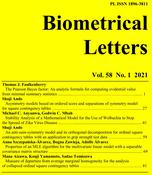
Biometrical Letters Vol. 58(1), 2021, pp. 59-68


For the analysis of R × R square contingency tables, we need to estimate an unknown probability distribution with high confidence from obtained observations. For that purpose, we need to perform the analysis using a statistical model that fits the data well and has a simple interpretation. This study proposes two original models that have symmetric and asymmetric structures between the probability with which the sum of row and column variables is t, for t = 2, . . . ,R, and the probability with which the sum of row and column variables is 2(R + 1) - t. The study also reveals that it is necessary to satisfy the anti-global symmetry model, in addition to the proposed asymmetry model, in order to satisfy the proposed symmetry model. This decomposition theorem is useful to explain why the proposed symmetry model does not hold. Moreover, we show that the value of the likelihood ratio chi-squared statistic of the proposed symmetry model is equal to the sum of those of the decomposed models.We evaluate the utility of the proposed models by applying them to real-world grip strength data.

anti-diagonal cell, asymmetry, necessary and sufficient condition, symmetry, test statistic

